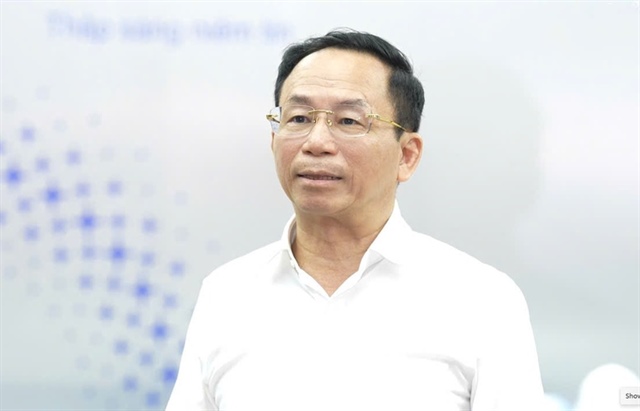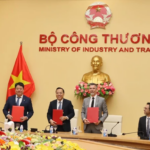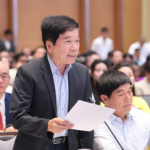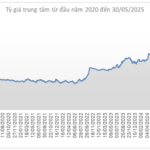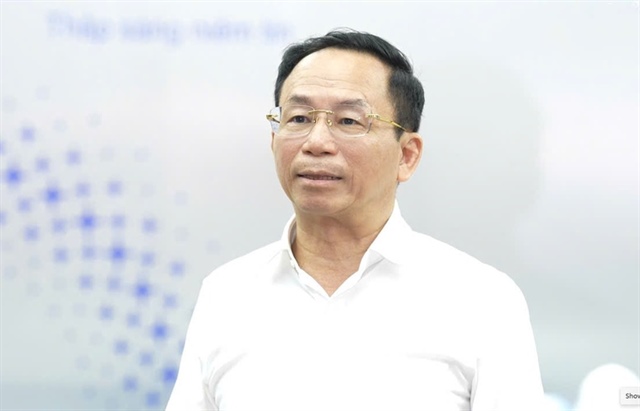
Mr. Nguyen Xuan Nam, Deputy General Director of EVN, stated that the electricity price adjustment is based on both legal grounds and the practical demands of the national power grid’s operation. |
On May 9, the Vietnam Electricity (EVN) announced Decision No. 599/QD-EVN dated May 7, 2025, on adjusting the average retail electricity price. The new average retail electricity price after the adjustment is 2,204.0655 VND/kWh (excluding value-added tax) and will take effect from May 10, 2025. This adjustment represents an increase of 4.8% compared to the current average electricity price.
On the same day, the Ministry of Industry and Trade also issued Decision No. 1279/QD-BCT on electricity prices, which stipulates the retail electricity prices for different customer groups and the prices for electricity retailers.
Explaining the basis for this adjustment, Mr. Nguyen Xuan Nam, Deputy General Director of EVN, stated that the electricity price adjustment is based on both legal grounds and the practical demands of the national power grid’s operation.
In terms of legal basis, the electricity price adjustment complies with the Electricity Law (amended in 2024), the Government’s Decree No. 72/2025/ND-CP, and the specific guidance in Circular No. 22/2025 of the Ministry of Industry and Trade. These documents clearly define the principles, mechanisms, and conditions for electricity price adjustments, ensuring transparency, publicity, and accurate reflection of production and supply costs.
In terms of practical demands, according to the approved power supply plan for 2025, the total electricity demand in the country is expected to increase by more than 12% compared to 2024. This equates to an additional electricity output of approximately 34 billion kWh. To meet this increased demand, the national power grid has to mobilize more expensive power sources such as coal-fired power, gas-fired power, and especially oil-fired power.
Currently, the production cost of coal-fired power is around 2,400 VND/kWh, while gas-fired power, especially liquefied natural gas (LNG), costs more than 3,000 VND/kWh. The most expensive source, oil-fired power, reaches nearly 5,000 VND/kWh. When these input parameters are applied to the electricity price calculation formula stipulated in Decree 72, the corresponding increase is determined to be 4.8%.
Ensuring minimal impact on poor and policy-beneficiary households
According to EVN, in the context of rising generation costs in recent years, EVN and its member units have been determined to reduce and save costs. The target for 2025 is to achieve a minimum of 10% cost savings in regular and major repair expenses. EVN also closely coordinates with the National Power Transmission Corporation to optimize the operation of the power system and the electricity market to ensure safe and continuous power supply.
EVN affirms that this electricity price adjustment will essentially ensure that poor and policy-beneficiary households are not significantly affected. Poor households and policy-beneficiary households will continue to receive support in accordance with Decision No. 28/2014/QD-TTg dated April 7, 2014, of the Prime Minister. Poor households are supported with an amount equivalent to the electricity consumption of 30 kWh/month, and policy-beneficiary households with a monthly electricity consumption of no more than 50 kWh are supported with an amount equivalent to the electricity consumption of 30 kWh/month, in line with the Government’s policy.
Sufficient power supply during the hot season in 2025
Regarding the forecast of prolonged hot weather in 2025, EVN stated that this factor had been considered since the development of the power supply scenario at the end of 2024.
Additionally, in the first four months of 2025, the power demand in the North has consistently been higher than in the Central and Southern regions. In response, EVN proactively established a task force and developed weekly plans to balance the load and ensure harmony in demand and supply across the country.
In the long term, EVN implements comprehensive solutions to ensure a stable power supply under all circumstances, including balancing costs and ensuring input materials for thermal power plants, striving to ensure the progress of large-scale power source projects such as the Hoa Binh Hydropower Plant Expansion Project and the Quang Trach 1 Thermal Power Plant, and executing transmission line projects according to schedule.
Anh Tho
– 11:55, May 10, 2025
The Power Plan Update: Synchronized Implementation for Energy Security
By 2030, Vietnam aims to be among the top 4 ASEAN countries in terms of electricity supply reliability and within the top 3 for electricity access index. Additionally, the country aspires to have 50% of commercial and 50% of residential buildings utilize self-produced and self-consumed rooftop solar power.
The Intriguing Knot Behind the “Urgent” Letter of Renewable Energy Companies
Nearly 30 investors, pouring billions of US dollars into solar and wind projects in Vietnam, sent an urgent letter a few weeks ago.
The Power of Words: Crafting a Captivating Title
“EVN Embraces the Future: Official Handover of the Phu My 2.2 BOT Power Plant”
“Upon acquisition and the subsequent handover of the power plant, the Vietnam Electricity Group will take over its operations and management. With a projected annual contribution of approximately 4.6 billion kWh of electricity to the National Power System, the plant is set to play a significant role in meeting the country’s energy demands.”
Powering the Long Thanh Airport: An Electrifying Endeavor
To ensure an uninterrupted power supply for construction activities and immediate electricity access when the Long Thanh International Airport commences operations, Dong Nai Power Company, a subsidiary of Southern Power Corporation (EVNSPC), has been diligently undertaking management, operation, and investment activities for the power system.



















![[IR AWARDS] June 2025 Disclosure Calendar: Mark Your Dates](https://xe.today/wp-content/uploads/2025/06/HinhT6_01-218x150.png)






